- Home
- David McCullough
John Adams Page 13
John Adams Read online
Page 13
Adams considered Jefferson his protege at Philadelphia; Jefferson, impressed by Adams's clarity and vigor in argument, his “sound head,” looked upon him as a mentor. They served on committees together, and as the pace quickened in the weeks after Jefferson's arrival, they were together much of the time. As would be said, each felt the value of the other in the common task.
• • •
IF THERE WAS “a tide in the affairs of men,” as Abigail had reminded John, now was “the flood.” “Every post and every day rolls in upon us independence like a torrent,” he wrote on May 20.
Despite drenching rain, an open-air public meeting that day at the State House Yard drew a throng of thousands who listened as the May 15 resolve was read aloud, then voiced a demand vote for a new Pennsylvania constitution and a new legislature.
At week's end, on Friday, May 24, General Washington arrived for two days of meetings with Congress to report his heightened concern for the situation at New York, where a British attack was expected any time. The King, it was now known, had hired some 17,000 German troops to fight in America. At New York, Washington had at most 7,000 men fit for duty.
Three days later came word that on May 15, the Virginia convention at Williamsburg had resolved unanimously to instruct the Virginia delegation at Philadelphia “to declare the United Colonies free and independent states.” An exultant John Adams wrote to Patrick Henry that the “natural course and order of things” was coming to pass at last. “The decree is gone forth, and it cannot be recalled, that a more equal liberty than had prevailed in other parts of the earth must be established in America.”
On Friday, June 7, at the State House, Richard Henry Lee rose to speak. Sunshine streamed through the high windows. Lee, slim and elegant, was a spirited orator who was said to practice his gestures before a mirror. In a hunting accident years before, he had lost the fingers of his left hand, which he kept wrapped in a black handkerchief, and this, with his lithe figure and aquiline nose, gave him a decidedly theatrical presence. The importance of the moment was understood by everyone in the room.
Resolved [Lee began]:... That these United Colonies are, and of a right ought to be, free and independent states, that they are absolved from all allegiance to the British Crown, and that all political connection between them and the state of Great Britain is, and ought to be, totally dissolved.
Adams immediately seconded the motion and the day following, Saturday, June 8, the debate began. Speaking in opposition, John Dickinson, James Wilson, Robert Livingston, and Edward Rutledge declared, according to notes kept by Jefferson, that while “friends of the measure,” they opposed any declaration of independence until “the voice of the people” drove them to it. Further, should Congress proceed before hearing the “voice,” then certain colonies “might secede from the union.” It was the threat Dickinson in his anger had used earlier against Adams, but whether it was Dickinson speaking now, Jefferson did not record. Nor did he record what Adams, Lee, and George Wythe said, only that they declared public opinion to be ahead of Congress: that “the people wait for us to lead the way,” that the European powers would neither trade nor treat with the colonies until they established independence, that “the present [military] campaign may be unsuccessful, and therefore we had better propose an alliance while our affairs wear a hopeful aspect.” And that it was essential “to lose no time.”
Intense debate continued past dark. Candles were brought in. “The sensible part of the house opposed the motion,” wrote an irate Edward Rutledge. “No reason could be assigned for pressing into this measure, but the reason of every madman.”
On Monday, June 10, after President John Hancock reconvened the assembly, Rutledge and the “cool party” succeeded in having the final vote delayed for twenty days, until July 1, to allow delegates from the middle colonies time to send for new instructions. Nonetheless, it was agreed that no time be lost in preparing a declaration of independence. A committee was appointed, the Committee of Five, as it became known, consisting of Jefferson, Adams, Roger Sherman, Robert Livingston, and Benjamin Franklin, who had by now returned from his expedition to Canada but was ill and exhausted and rarely seen.
On the floor above, meantime, in the Banqueting Hall of the State House, another revolution was transpiring as the Pennsylvania Assembly struggled over what instructions to give its delegation.
Adams, who had not written a word to Abigail in nearly two weeks, dashed off a letter saying, “Great things are on the tapis.”
• • •
JEFFERSON WAS TO DRAFT the declaration. But how this was agreed to was never made altogether clear. He and Adams would have differing explanations, each writing long after the fact.
According to Adams, Jefferson proposed that he, Adams, do the writing, but that he declined, telling Jefferson he must do it.
“Why?” Jefferson asked, as Adams would recount.
“Reasons enough,” Adams said.
“What can be your reasons?”
“Reason first: you are a Virginian and a Virginian ought to appear at the head of this business. Reason second: I am obnoxious, suspected and unpopular. You are very much otherwise. Reason third: You can write ten times better than I can.”
Jefferson would recall no such exchange. As Jefferson remembered, the committee simply met and unanimously chose him to undertake the draft. “I consented: I drew it [up].”
Possibly neither of their memories served, and possibly both were correct. Jefferson may well have been the choice of the committee and out of deference or natural courtesy, he may well have offered Adams the honor. If there is anything that seems not in keeping, it is the tone of Adams's self-deprecation, which is more that of the old man he became than the Adams of 1776, who was anything but inadequate as a writer and who was by no means as unpopular as he later said. If he was thought “obnoxious,” it would have been only by a few, and only he himself is known to have used the word. In all the surviving record of official and private papers pertaining to the Continental Congress, there is only one member or eyewitness to events in Philadelphia in 1776 who wrote disparagingly of John Adams, and that was Adams writing long years afterward. As critical as he could be in his assessment of others, the man he was inclined to criticize most severely was himself. In fact, the respect he commanded at Philadelphia that spring appears to have been second to none.
Unquestionably, Adams did value Jefferson's literary talents, but he knew also how much else he must attend to in the little time available, and the outcome of the “great question” was by no means certain. Already Adams was serving on twenty-three committees, and that same week was assigned to three more, including an all-important new Continental Board of War and Ordnance, of which he was to be the president.
That there would be political advantage in having the declaration written by a Virginian was clear, for the same reason there had been political advantage in having the Virginian Washington in command of the army. But be that as it may, Jefferson, with his “peculiar felicity of expression,” as Adams said, was the best choice for the task, just as Washington had been the best choice to command the Continental Army, and again Adams had played a key part. Had his contribution as a member of Congress been only that of casting the two Virginians in their respective, fateful roles, his service to the American cause would have been very great.
• • •
ALONE IN HIS UPSTAIRS PARLOR at Seventh and Market, Jefferson went to work, seated in an unusual revolving Windsor chair and holding on his lap a portable writing box, a small folding desk of his own design which, like the chair, he had had specially made for him by a Philadelphia cabinetmaker. Traffic rattled by below the open windows. The June days and nights turned increasingly warm.
He worked rapidly and, to judge by surviving drafts, with a sure command of his material. He had none of his books with him, nor needed any, he later claimed. It was not his objective to be original, he would explain, only “to place before mankind the common sense
of the subject.”
Neither aiming at originality of principle or sentiment, nor yet copied from any particular and previous writing, it was intended to be an expression of the American mind, and to give to that expression the proper tone and spirit called for by the occasion.
He borrowed readily from his own previous writing, particularly from a recent draft for a new Virginia constitution, but also from a declaration of rights for Virginia, which appeared in the Pennsylvania Evening Post on June 12. It had been drawn up by George Mason, who wrote that “all men are born equally free and independent, and have certain inherent natural rights... among which are the enjoyment of life and liberty.” And there was a pamphlet written by the Pennsylvania delegate James Wilson, published in Philadelphia in 1774, that declared, “All men are, by nature equal and free: no one has a right to any authority over another without his consent: all lawful government is founded on the consent of those who are subject to it.”
But then Mason, Wilson, and John Adams, no less than Jefferson, were, as they all appreciated, drawing on long familiarity with the seminal works of the English and Scottish writers John Locke, David Hume, Francis Hutcheson, and Henry St. John Bolingbroke, or such English poets as Defoe (“When kings the sword of justice first lay down, / They are no kings, though they possess the crown. / Titles are shadows, crowns are empty things, / The good of subjects is the end of kings”). Or, for that matter, Cicero. (“The people's good is the highest law.”)
Adams, in his earlier notes for an oration at Braintree, had written, “Nature throws us all into the world equal and alike.... The only maxim of a free government ought to be to trust no man [kings included] to endanger public liberty.” The purpose of government, he had said in his recent Thoughts on Government, was the “greatest quantity of human happiness.”
What made Jefferson's work surpassing was the grace and eloquence of expression. Jefferson had done superbly and in minimum time.
I was delighted with its high tone and flights of oratory with which it abounded [Adams would recall], especially that concerning Negro slavery, which, though I knew his southern brethren would never suffer to pass in Congress, I certainly would never oppose. There were other expressions which I would not have inserted, if I had drawn it up, particularly that which called the King tyrant... I thought the expression too passionate; and too much like scolding, for so grave and solemn a document; but as Franklin and Sherman were to inspect it afterwards, I thought it would not become me to strike it out. I consented to report it, and do not now remember that I made or suggested a single alteration.
A number of alterations were made, however, when Jefferson reviewed it with the committee, and several were by Adams. Possibly it was Franklin, or Jefferson himself, who made the small but inspired change in the second paragraph. Where, in the initial draft, certain “truths” were described as “sacred and undeniable,” a simpler, stronger “self-evident” was substituted.
We hold these truths to be self-evident, that all men are created equal...
Adams had no doubt that there would be further changes called for and considerable debate over details and language once the declaration was submitted to Congress for approval. Still, he was confident enough about the draft that he laboriously transcribed the full text in his own hand, and later sent the copy to Abigail, who, understandably, thought he had written the Declaration.
• • •
THE PRESSURES or RESPONSIBILITY grew greater for Adams almost by the hour. As head of the new Board of War, meeting every morning and evening, he was acutely aware of Washington's distress at New York. Dispatch riders from the general's headquarters brought repeated warnings that arms, lead, flints, medicines, and entrenching tools were all urgently needed. At Boston the troops were “almost mutinous in want of pay.” In Canada, where the remnants of an American army were still holding out, the situation was gravely compounded by the ravages of smallpox.
On June 15, the provincial legislature of New Jersey had ordered the arrest of its royal governor, William Franklin, the estranged, illegitimate son of Benjamin Franklin, and authorized its delegates in Congress to vote for independence. To see that this was done, five new New Jersey delegates had been appointed.
In Maryland, delegate Samuel Chase, who had earlier gone to Canada with Benjamin Franklin, was rounding up support for independence, as perhaps no one else could have. A huge, red-faced young man of inexhaustible energy, Chase refused to accept the dictum that Maryland's delegates must vote down independence. “I have not been idle,” he reported to Adams.
As he had for months now, Adams struggled to keep a balance with the need, on one hand, for all possible haste, and the need, on the other, to keep from pushing too fast, forcing events too soon. Some things, some people, must not be hurried. Time and timing were both of the essence, now more than ever. Reminders of time passing were everywhere about him: the great clock ticking away on the outside wall of the State House; bells at night striking the hour; the “clarions” of a hundred roosters calling across town as he began his day at first light.
“What in the name of Common Sense are you gentlemen of the Continental Congress about?” demanded a constituent writing from Massachusetts. “Is it dozing?”
“The only question is concerning the proper time for making a specific declaration in words,” Adams replied.
Some people must have time to look around them, before, behind, on the right hand, and on the left, and then to think, and after all this to resolve. Others see at one intuitive glance into the past and the future, and judge with precision at once. But remember you can't make thirteen clocks strike precisely alike at the same second.
No one in Congress had worked harder or done more to bring about a break with Britain. But it was the fact of independence more than the words on paper that concerned Adams, and especially for what it would do to unify the colonies and bring “spirit” to American military operations. Facts were “stubborn things,” he had once argued in defense of the British soldiers after the Boston Massacre, and as stubborn as any of the large facts bearing heavily on his mind now was “the bloody conflict we are destined to endure.”
On June 23 a conference of committees from every county in Pennsylvania declared that the delegates of Pennsylvania in Congress should vote for independence. “You see therefore,” Adams wrote to Samuel Chase, “that there is such a universal expectation that the great question will be decided the first of July... to postpone it again would hazard convulsions and dangerous conspiracies.”
The birth of a new nation was at hand, perhaps truly, as Thomas Paine had written, a new world. “Solemn” was Adams's word for the atmosphere in Congress.
Chapter Three
Colossus of Independence
[His] power of thought and expression... moved us from our seats.
—Thomas Jefferson
MONDAY, JULY 1, 1776, began hot and steamy in Philadelphia, and before the morning was ended a full-scale summer storm would break. Adams, as usual, was out of bed before dawn. He dressed, wrote a long letter to a former delegate, Archibald Bulloch, who was the new president of Georgia, and following breakfast, walked to the State House, knowing what was in store. “This morning is assigned the greatest debate of all,” he had said in the letter. “A declaration, that these colonies are free and independent states, has been reported by a committee some weeks ago for that purpose, and this day or tomorrow is to determine its fate. May heaven prosper the newborn republic.”
He had wished Bulloch to know also that constant vigil was being kept for the arrival of the British at New York. “We are in daily expectation of an armament before New York, where, if it comes, the conflict may be bloody,” he warned. Words in debate were one thing, the war quite another, but to Adams independence and the war were never disjunctive.
The object is great which we have in view, and we must expect a great expense of blood to obtain it. But we should always remember that a free constitution of civil governmen
t cannot be purchased at too dear a rate, as there is nothing on this side of Jerusalem of equal importance to mankind.
Presumably everything that could or need be said on the question of independence had been exhausted in Congress. Presumably, the question could be put and decided with little further ado. But it was not to be. John Dickinson had resolved to make one last appeal and Adams would be obliged to answer. They would rise to make their cases like the great lawyers they were, each summoning all his powers of reason and persuasion.
At ten o'clock, with the doors closed, John Hancock sounded the gavel. Richard Henry Lee's prior motion calling for independence was again read aloud; the Congress resolved itself into a committee of the whole and “resumed consideration.” Immediately, Dickinson, gaunt and deathly pale, stood to be heard. With marked earnestness, he marshaled all past argument and reasoning against “premature” separation from Britain. “He had prepared himself apparently with great labor and ardent zeal,” Adams would recall admiringly. “He conducted the debate not only with great ingenuity and eloquence, but with equal politeness and candor.”
Though no one transcribed the speech, Dickinson's extensive notes would survive. He knew how unpopular he had become, Dickinson began. He knew that by standing firm, as a matter of principle, he was almost certainly ending his career. “My conduct this day, I expect, will give the finishing blow to my once great... and now too diminished popularity.... But thinking as I do on the subject of debate, silence would be guilt.”
To proceed now with a declaration of independence, he said, would be “to brave the storm in a skiff made of paper.”
When he sat down, all was silent except for the rain that had begun spattering against the windows. No one spoke, no one rose to answer him, until Adams at last “determined to speak.”

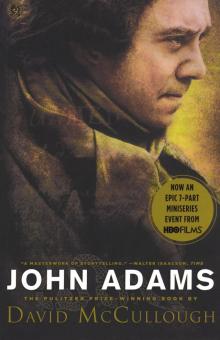 John Adams
John Adams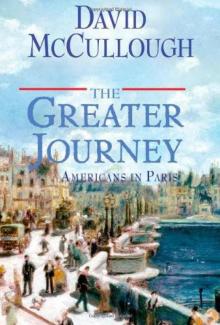 The Greater Journey: Americans in Paris
The Greater Journey: Americans in Paris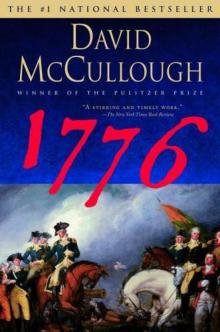 1776
1776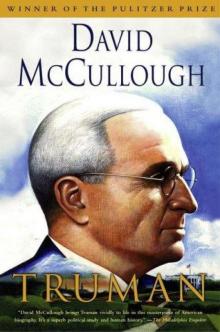 Truman
Truman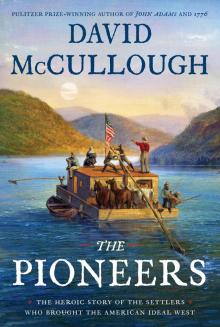 The Pioneers
The Pioneers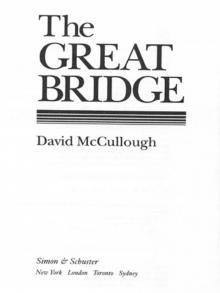 The Great Bridge: The Epic Story of the Building of the Brooklyn Bridge
The Great Bridge: The Epic Story of the Building of the Brooklyn Bridge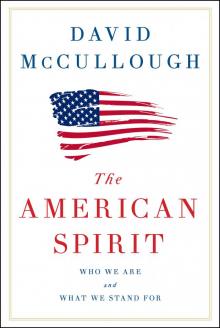 The American Spirit
The American Spirit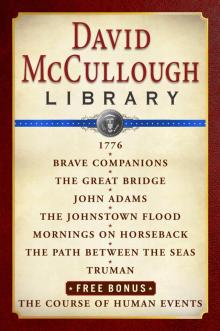 David McCullough Library E-book Box Set
David McCullough Library E-book Box Set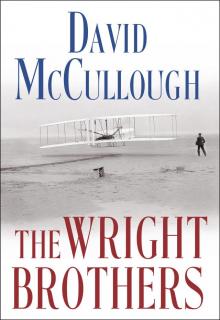 The Wright Brothers
The Wright Brothers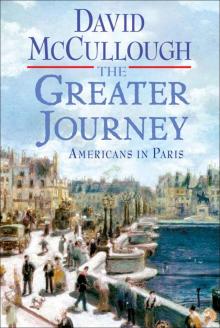 The Greater Journey
The Greater Journey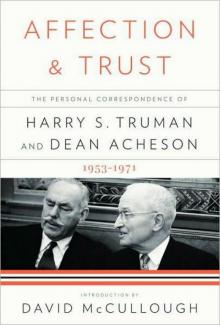 Affection and Trust: The Personal Correspondence of Harry S. Truman and Dean Acheson, 1953-1971
Affection and Trust: The Personal Correspondence of Harry S. Truman and Dean Acheson, 1953-1971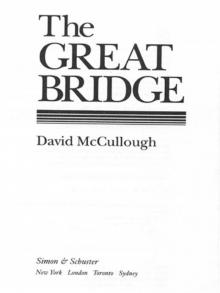 The Great Bridge
The Great Bridge